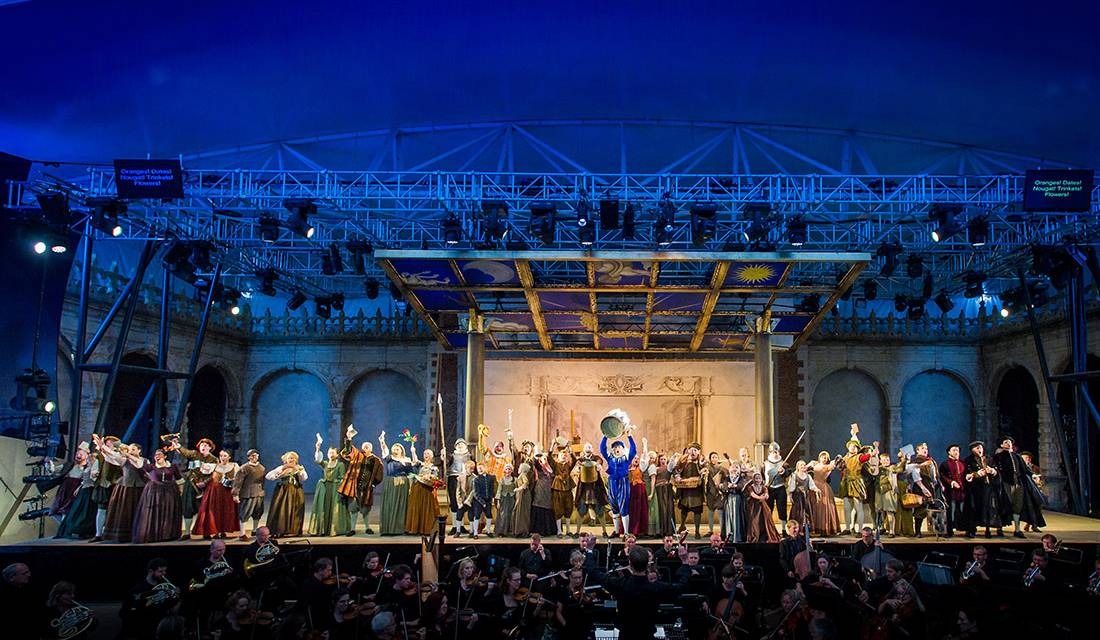Getting a job in the arts can be hard – there’s a lot of competition out there and you’ll need to shine to stand out. But there’s plenty you can do to improve your chances and there’s probably a lot more opportunities than you realise.
What’s out there?
So you want to work in opera but your singing makes dogs’ ears bleed and you couldn’t keep time if your life depended on it. Well, don’t despair. While singing, conducting or playing an instrument might be the most obvious ways of getting into opera, they’re not everything.
Think about your interests and what you’re good at. If fashion is your thing, then costume designer or makeup artist could be for you. Other behind-the-scenes jobs include set design and building; the latter could cover carpentry, metal-working and more. There are also front-of-house jobs: ushers, bar tending and box office staff, for example. There are plenty of admin and office-based positions too – most opera houses and companies have PR and marketing departments, as well as membership, ticketing, accounts and so on.
Be the best
How do you get to Carnegy Hall? Practice. It’s an old joke, but it’s true. There is a lot of competition in arts jobs and if you want to get ahead, you’ll have to stand out. Whatever your chosen field, you’ll need to be the best you can be, and this means practice.
This is obvious for performers – they need to hone their skills with their instrument, whether that be voice, piano or flute. But it’s also true of carpenters, designers and administrators. Get experience in what you want to do and learn to do it well.
But it is possible to get too much of a good thing – unless you’re talking about ice cream – and performers shouldn’t overdo the practice. This is especially true for singers, who can strain their voices and potentially damage their vocal chords. Aim for between 1 and 3 hours a day.
Volunteer
One way of getting experience is volunteering. If you have a theatre close by, then they’re almost certain to welcome volunteers. There’s likely to be several opportunities, from ushering and bar tending to admin and helping out at the box office. You may well get to see some productions for free, saving you a bit of money in the long run.
Apprenticeships and internships
These are more ways to get some all-important practic. They will give you valuable work experience in your chosen field and often allow you to study for a relevant qualification. The Royal Opera House has its own apprenticeship scheme and you can apply to the English Touring Opera for an internship. Other schemes are available – Google is your friend.
Get the right qualifications
You can’t get a job as an accountant without studying accountancy, so why should opera be any different? Most musicians and singers will study music at university and the latter will be expected to have at least a working knowledge of Italian, French and German.
Check what’s needed for your chosen career – if you want to be in marketing will you be expected to have a marketing degree or would something related to music be more relevant? Maybe you can find a course that combines elements of both.
Get to know opera
The obvious way to do this is to attend as many shows as you can. But it’s not just about individual productions. Get to know the artform itself: its history, its meaning, its relevance today. The more you know, the more you have to offer a potential employer and the more you will get out of your chosen career.
Find that job!
Now that you’ve got the knowledge, the experience and the qualifications it’s time to get proactive in finding the right role. There are a number of job listing sites for the arts, which you should check regularly, while many of the larger opera houses and companies will have vacancies listed on their own sites. Use Twitter to your advantage – follow as many relevant accounts as you can find. Here are a few sites to get you started:
- Arts Jobs is a free mailing list from Arts Council England
- Artful Jobs is a jobs board for anyone looking for a career in culture and the arts
- The Dots is a professional network for those working in the creative industries, with jobs listings
- The Guardian is a good source of arts jobs, with hundreds of vacancies listed https://jobs.theguardian.com/jobs/arts-and-heritage/
- Welsh National Opera has a vacancies page in its website
- Opera Up Close lists jobs and traineeships
- Opera Holland Park has job vacancies, volunteering opportunities and work experience and internships
- Opera North lists vacancies
- Glyndebourne has jobs and work experience opportunities
- The Royal Opera House lists vacancies, apprenticeships and more
- The Birmingham Hippodrome has a variety of paid and unpaid roles
This is just a small taster of what’s available, so there’s sure to be something suitable close to you. Good luck!
Image
Producing an opera requires a huge team of people, including singers, musicians, set builders, lighting technicians, costume designers and more (La boheme, Opera Holland Park, 2016, by Robert Workman).


I am Rajesh kumar . artists flute . winner of grade final 2015 .play flute in world record programme in India . actor.anchtor. righter .skech artist.